Students Use Art to Grapple With Climate Change Challenges
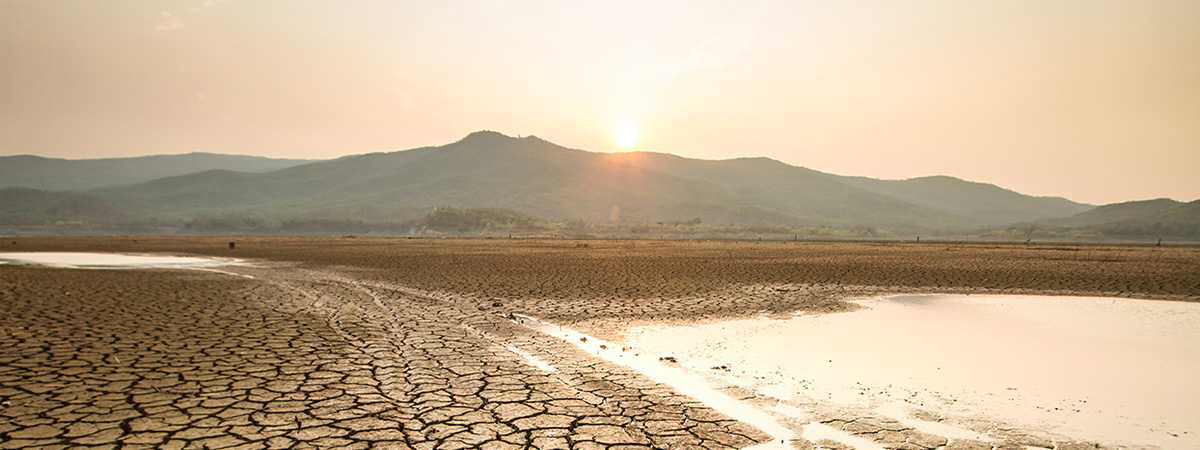
In response to the health threats posed by climate change, Dr. Mona Arora’s course guided students to express their frustration and determination through artworks.
Often when students learn about the many devastating effects of climate change on plants, animals, ecosystems and humans, they experience stress and despair because there are so many crises that need solutions. It is not uncommon for students to feel helpless and fearful when faced with the real consequences that our world faces from climate change.
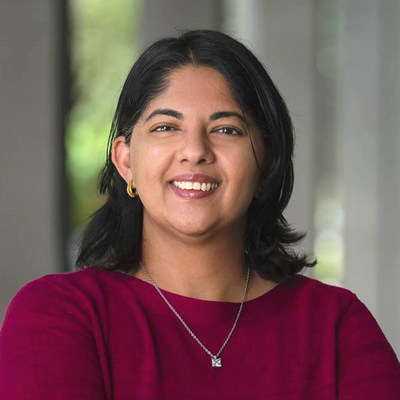
Mona Arora, PhD, MSPH
Mona Arora, PhD, MSPH, set out to engage these complex emotions in her course EHS 525 Global to Local: Environmental Change and Human Health in the Spring 2022 semester. In the class, Dr. Arora made the connections between climate, health, and resilience, and how those connections could be expressed through art.
“Evidence is building that shows the mental health ramifications of sustained exposure to the climate crisis in the form of anxiety and grief. New terms have emerged such as “ecoanxiety” and “ecogrief” to describe this new human experience,” said Dr. Arora, “Too often when we teach climate change, we neglect to acknowledge the stress that students experience when they hear about one doom and gloom situation after another.”
Dr. Arora recruited Ellen McMahon, MFA, MS, the Associate Dean for Research in the Uarizona College of Fine Arts, as a guest lecturer for the course. In her lecture, “Climate, Art and Resilience,” McMahon explored how art has been used as a tool to engage, communicate, advocate, and express emotions and determination related to environmental crises linked to climate change. For one of the assignments, students were guided to create an artwork that expressed their feelings and perceptions on climate change.
“Unlike most forms of climate communication, art has its origins in subjective experience,” said Dr. McMahon, “Art educates our emotions, improving our ability to know how we feel, and feel what we know. This in turn heightens awareness of our social bonds and connections to everything, leading us to make better choices about how to live in a turbulent world.”
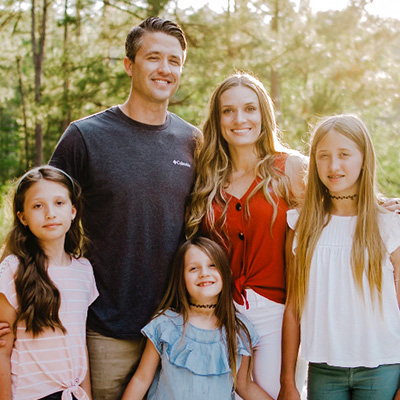
Ryan Sitton, MPH
For Ryan Sitton, a public health student who graduated in Spring 2022 with his MPH in the One Health concentration, this was the first class he had ever taken that focused exclusively on climate change. A non-traditional student and father of three daughters, Ryan found that the course changed his perspective.
“This course changed my understanding of climate change and public health by providing a neutral learning platform, a space where we could really explore the topic free from personal opinion and associated politics,” said Ryan, “It was refreshing to step away from the doom and gloom that is often associated with climate change and to get a better understanding of how public health leaders can play a pivotal role to implement positive changes.”
Although he has never had an art assignment for a course before, Ryan found the process much more impactful than he anticipated. His painting portrays a dark future where people compete for resources.
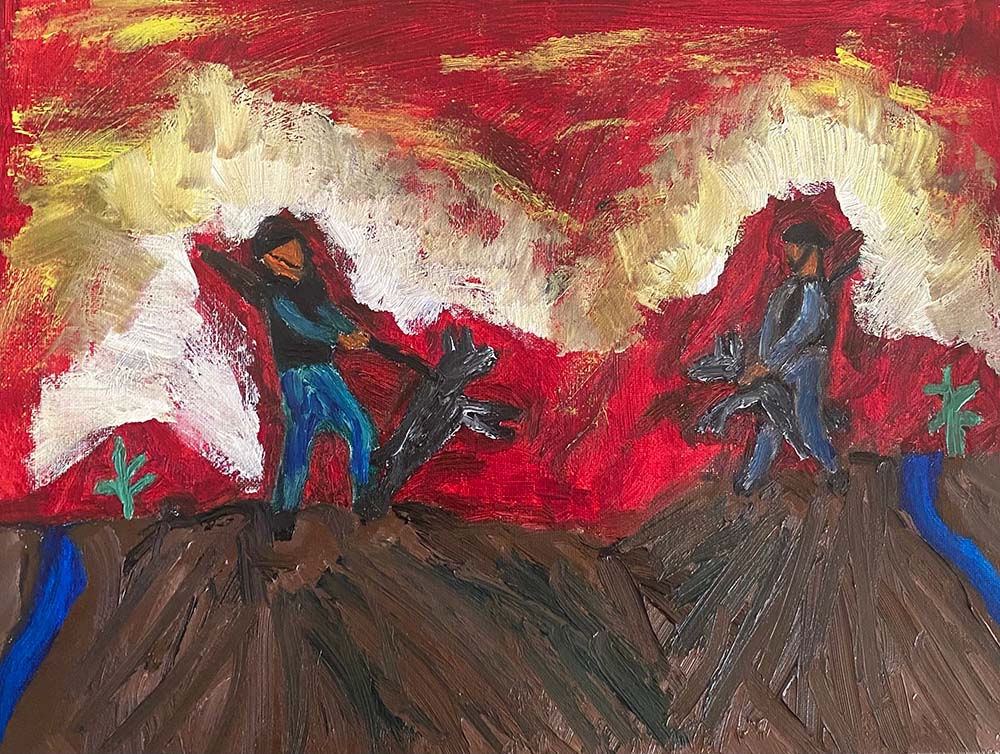
“In my painting, in the context of climate change, the soldiers represent different countries and communities that are guarding their finite resources (the single plant and stream). Hopefully this is not the actual future, but I see it as a cause for concern and a very likely scenario,” said Ryan.
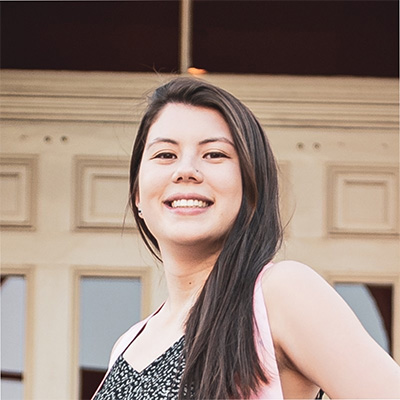
Loren Halili, MPH
Loren Halili also graduated in Spring 2022 with her MPH in the Environmental and Occupational Health concentration. For her, the course expanded her understanding of how climate change impacts human health in many different ways, and the importance of public health strategies to mitigate those health risks. For her climate change artwork, she wrote a poem.
The world around me,
Is not what it used to be
The air is filled with pollutants made of dust and debris
My little brother with asthma says it’s becoming harder to breath
The rain is never ending, falling harder and faster
My cousins live in the Philippines, where Typhoons have created disaster
Fires rip through terrain, that’s dry as a bone
My family in Oregon calls me on the phone.
They say, “The sky is red! There are flames anywhere I look!”
Moral of the story,
Climate change is real, and isn’t some made-up book
If a tree falls in a forest and no one is around,
How do we know if it even made a sound?
Who cares if people look at us strange?
We all need to speak up about climate change
Some say “there are more important issues that are worth a crown”
So, do we just sit here and watch our world burn down?
The topic is already met with a so much disagree
But differing opinions shouldn’t stop us from spilling the tea
From tornadoes in Tennessee
To diminishing marine life undersea
All I know is,
that the world around me
Is not what it used to be
“I have family all around the world that have been affected by climate change in different ways. I hope my artwork gives a raw experience of the impacts of climate change,” said Loren, “I wrote my poem from a first-person perspective and I hope it shows that anyone’s family could go through these struggles. I feel that adding personal experience will help shift perspectives for those who may not have experienced climate change directly.” Loren is now working for the Center for Rural Health, part of MEZCOPH, as an Outreach Instructional Specialist for the COVID-19 Health Disparities grant.
Both faculty, Dr. Arora and McMahon, we impressed by the response of all the student in the course and inspired by the artworks they created. The complex impacts of climate change will reshape our world and place many communities in jeopardy, and the intersection of public health and artistic creation can help us find a path forward, to heal, to process, and to prepare.
The course will be offered again in Spring 2023 for both undergraduate and graduate students. Interested students can reach out to Dr. Mona Arora, manand@arizona.edu, for more information.

